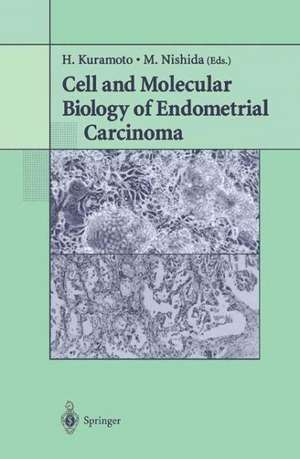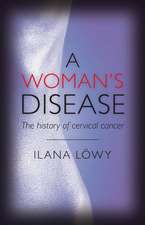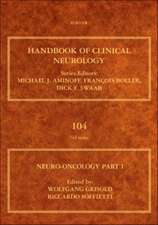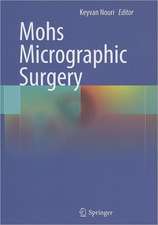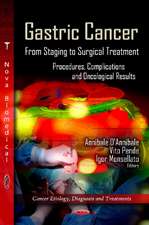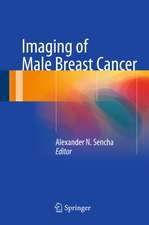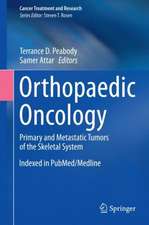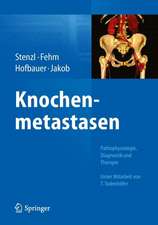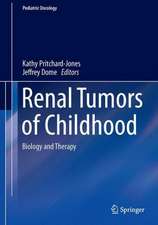Cell and Molecular Biology of Endometrial Carcinoma
Editat de H. Kuramoto, M. Nishidaen Limba Engleză Hardback – iul 2003
| Toate formatele și edițiile | Preț | Express |
|---|---|---|
| Paperback (1) | 941.02 lei 43-57 zile | |
| Springer – 8 oct 2012 | 941.02 lei 43-57 zile | |
| Hardback (1) | 952.89 lei 43-57 zile | |
| Springer – iul 2003 | 952.89 lei 43-57 zile |
Preț: 952.89 lei
Preț vechi: 1162.06 lei
-18% Nou
Puncte Express: 1429
Preț estimativ în valută:
182.34€ • 190.85$ • 151.76£
182.34€ • 190.85$ • 151.76£
Carte tipărită la comandă
Livrare economică 31 martie-14 aprilie
Preluare comenzi: 021 569.72.76
Specificații
ISBN-13: 9784431006138
ISBN-10: 4431006133
Pagini: 319
Ilustrații: XIV, 319 p.
Dimensiuni: 155 x 235 x 25 mm
Greutate: 0.66 kg
Ediția:2003
Editura: Springer
Colecția Springer
Locul publicării:Tokyo, Japan
ISBN-10: 4431006133
Pagini: 319
Ilustrații: XIV, 319 p.
Dimensiuni: 155 x 235 x 25 mm
Greutate: 0.66 kg
Ediția:2003
Editura: Springer
Colecția Springer
Locul publicării:Tokyo, Japan
Public țintă
ResearchDescriere
The 15th International Symposium of the Japan Human Cell Society on Cell and Molecular Biology of Endometrial Carcinoma brought together leading researchers from Japan and around the world. The papers collected here are the work of twenty-two leaders in their field and are organized in ten major categories. The first section, in vitro experimental systems, takes up the pioneering work by Kuramoto in 1968 and Nishida in 1980 in establishing, respectively, the HEC-1 and hormone-responsive endometrial carcinoma cell lines. Other topics include apoptosis, proliferation, and growth factors; cell cycle regulators; signaling pathways; angiogenesis; carcinogenesis; hormones and hormone receptors; genes and gene expression; endometrial receptivity; and chemo-resistance and -sensitivity. Presenting the latest work in the cell and molecular biology of endometrial carcinoma, this volume is a valuable resource for gynecologists, pathologists, and molecular biologists.
Cuprins
1 In Vitro Experimental Systems.- HEC-l Cells: Establishment of an In Vitro Experimental System in Endometrial Carcinoma.- Ishikawa Cells: Opening of In Vitro Hormone Research on Endometrial Carcinoma.- 2 Apoptosis, Proliferation, and Growth Factors.- Endometrial Stress Neuropeptides: Paracrine Effects on Cell Proliferation and Apoptosis.- Effect of Hepatocyte Growth Factor on the Expression of Matrix Metalloproteinases in the Invasion of Endometrial Cancer Cells in a Three-Dimensional Coculture System.- 3 Cell Cycle Regulators.- Involvement of Cell Cycle Regulators in Steroid Hormone-Induced Growth of Endometrial Carcinoma.- Expression of Cell Cycle Regulators in Endometrial Adenocarcinoma.- 4 Signaling Pathways.- Estrogen Receptor Signaling and Crosstalk with the Ah Receptor in Endometrial Cancer Cells.- Expression of Cyclooxygenase (COX)-2 in Human Endometrial Adenocarcinoma Cell Line HEC-1B: An In Vitro Model of the Expression of COX-2 by Platelet-Activating Factor, Human Chorionic Gonadotropin and Prostaglandin E2, and the Possible Signaling Pathways Involved.- Inhibition of AKT Oncogenic Pathway in Endometrial Cancer Cells.- 5 Angiogenesis.- A New Paradigm for Vascular Endothelial Cell Growth Factor Receptor Signaling in Adult Endothelium.- Sex Steroid-Dependent and -Independent Angiogenesis in Uterine Endometrial Cancers.- 6 Carcinogenesis.- Inhibitory Effects of Phytoestrogens and Related Herbal Extracts on Mouse Endometrial Carcinogenesis: A Review.- 7 Hormones and Hormone Receptors.- Role of Glycoprotein Hormones in Endometrial Cancer.- Contribution of Estrogen Receptor-? and Progesterone Receptor-B to Oncogenic K-Ras-Mediated NIH3T3 Cell Transformation.- 8 Genes and Gene Expression.- Regulation of Gene Expression in Endometrial Cancer Cells: Role of Extracellular Matrix in Mitochondrial Gene Expression.- Role of hMLHl Gene Hypermethylation in Endometrial Carcinogenesis.- Molecular Genetic Profiles of Serous and Endometrioid Endometrial Cancers, Genes Downregulated in Endometrial Cancers, and the Role of Epigenetics.- Biological Implications of Survivin Gene Expression in the Development of Endometriosis and Endometrial Carcinoma.- 9 Endometrial Receptivity.- Endometrial Cancer Cells as Models to Study Uterine Receptivity.- 10 Chemo-resistance and -sensitivity.- Steroid and Xenobiotic Receptor (SXR) is a Key System for the Acquisition of cis-Platinum Resistance in Endometrial Cancer Cells.- Relationship Between HER-2/neu Gene Status and Chemosensitivity of Human Endometrial Cancer Cell Lines.- 313.
Caracteristici
Provides the newest information on endometrial cancer in the field of molecular biology
